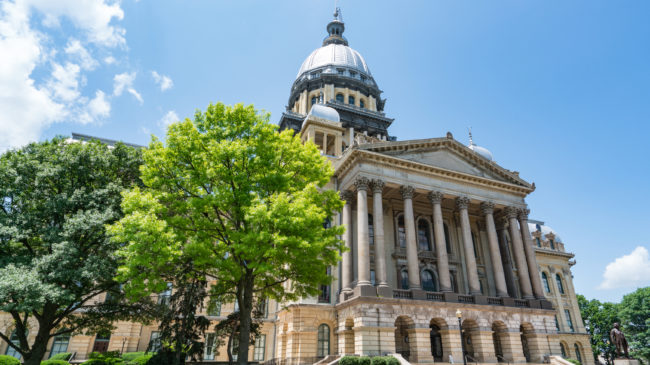All would have been good and well with Illinois public pensions if not for the financial disruptions and economic downturn caused by the coronavirus pandemic, right?
That’s the impression taxpayers might get from Illinois State Senate President Don Harmon’s request for a federal pension bailout. According to Harmon, Illinois was “on a path to fund the pension liability in a manner that is actuarially sound” until the pandemic arrived. Capitol News Illinois reported:
Senate President Don Harmon sent a letter this week to Illinois’ Congressional delegation asking that they push for more than $40 billion in COVID-19 relief aid, including $10 billion to bail out the state’s indebted pension funds…
Harmon also asked for $10 billion in relief for the state’s pension systems. Although “Illinois law has put the state on a path to fund the pension liability in a manner that is actuarially sound,” Harmon wrote, 2020 “will not be a normal year.” Harmon specifically asked that the feds “Provide direct cash assistance to the pension systems” or “Offer a low interest federal loan to aid Illinois in our efforts to restore and maintain retirement security for public sector workers …”
But even before COVID-19, Reason Foundation’s analysis found Illinois had a woeful average of just 40 cents saved for each dollar needed to cover long-term retirement liabilities. Harmon’s statement that the pension system was on the right fiscal path is contradicted by the $137 billion in unfunded pension liabilities and $54 billion in unfunded retiree health care promises that existed prior to the pandemic.
Many public pension plans may take a hit due to COVID-19 and the economic fallout. But it is worth asking why Illinois became the first state to cite the pandemic as a reason to ask federal taxpayers to bail out the state pension system? The stock market’s mostly downward trend over the last two months is a very convenient way to justify years of financial mismanagement of the Illinois pension system.
The decade of robust stock market performance that just ended failed to improve the fiscal health of the Illinois pension plans at all. In fact, it worsened. Illinois’ pension fund already had an alarmingly low 60 percent funded ratio in 2006—meaning it only had 60 percent of the funding needed to pay for the benefits promised to workers— and it has worsened since, falling to a 40 percent funded ratio in 2019. Thus, Illinois has less than half the assets it needs to cover the benefits promised to its public workers.
Questions for lawmakers and taxpayers, include: Would a federal, no-strings-attached public pension bailout solve the problem? Would a bailout simply prop up pension systems without fixing the structural problems that drove underfunding in the first place? Would states like Illinois make dramatic pension reforms that make the plans sustainable? Or would they treat future market shocks and economic downturns as another excuse to ask taxpayers to cover “unanticipated costs”?
Illinois is not the only state facing massive pension shortfalls. Public pension systems in states like Connecticut, New Jersey, Kentucky are also severely underfunded.
Some states responded to the last recession with difficult, yet prudent, reforms. Colorado, for example, enacted meaningful reforms to its main public pension system in 2018. It required increased contributions from employers and employees and implemented automatic benefit adjustments to serve as a sort of “shock absorber,” among other reforms.
Similarly, New Mexico recently enacted a bipartisan pension reform right before the onset of COVID-19, asking employers and employees to make some shared sacrifices for the long term solvency of the plan.
States that made pension reforms improved their retirement systems’ abilities to recover from the Great Recession of the late 2000s and were better prepared to weather the current market turmoil spurred by COVID-19 and the economic shutdowns.
While lawmakers in Colorado, New Mexico, Arizona, Michigan, Pennsylvania, Utah, and others took on the significant fiscal and political consequences of pension reforms to do the right thing for taxpayers and retirees, lawmakers in Illinois are looking for a bailout.
State Sen. Harmon referred to long-term pension liabilities, which are well within the state’s control, and pension debt that was years in the making as “unanticipated costs.” If federal taxpayers are asked to bail out Illinois’ pension system, it would set a precedent that would eliminate much of the motivation that states have to make responsible changes and pension reforms that can put retirement plans on the track to solvency.
Many public pension systems are going to facing concerns about their investment return assumptions, funding policies, unsustainable plan designs, and governance methods. Although the range of specific changes and ability to handle budgetary tradeoffs present a real challenge in the near term, state governments should be looking to set realistic investment return targets, paying pension debt down as fast as possible, and creating 21st-century style retirement plans that are attractive to young, professionally mobile employees and well-established public servants closer to retirement.
In addition, public pension plans should start thinking about how to prepare for economic downturns. States that save money and built safety cushions during the last decade of economic growth are better prepared to weather the financial storms that are bound to happen in economic cycles.
Most importantly, pension systems should always pay actuarially determined contributions. After all, there is no better way to avoid debt than paying your full pension bill on time.
Harmon is right that state governments are facing tough economic times. But the Illinois pension system was not on a path to solvency and its debt was far from unanticipated.
Stay in Touch with Our Pension Experts
Reason Foundation’s Pension Integrity Project has helped policymakers in states like Arizona, Colorado, Michigan, and Montana implement substantive pension reforms. Our monthly newsletter highlights the latest actuarial analysis and policy insights from our team.

